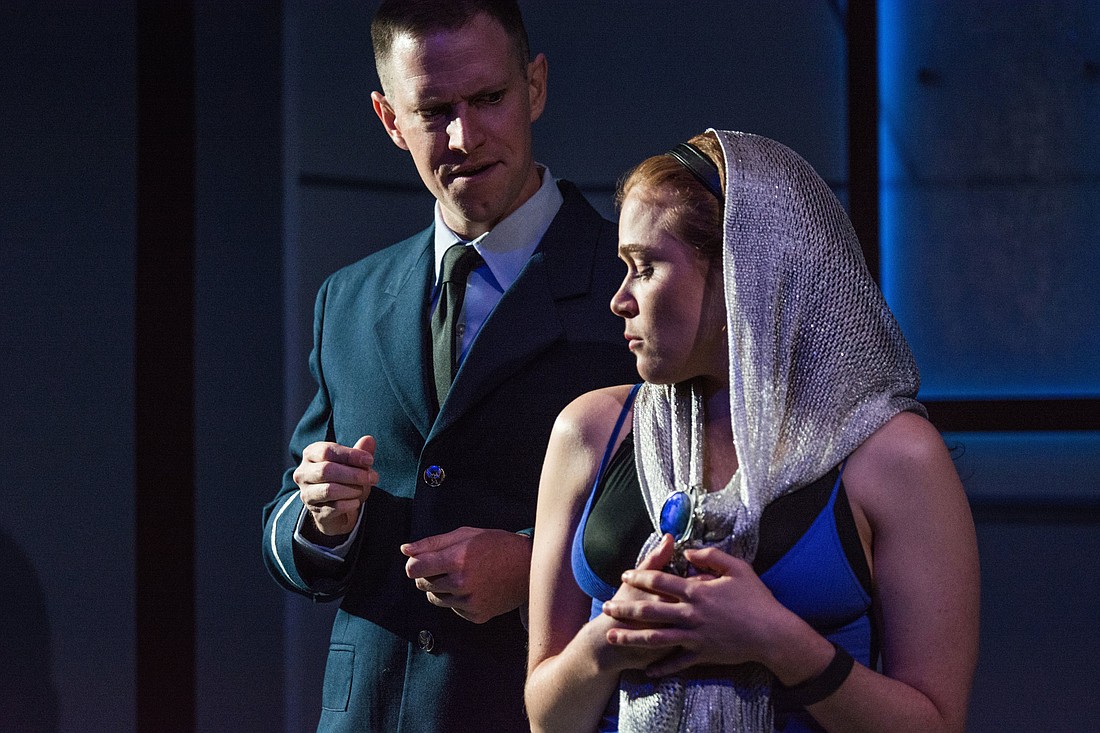- April 30, 2025
-
-
Loading

Loading

According to Jean Paul Sartre, “Hell is other people.” In Claire Kiechel’s “Pilgrims,” hell is other people in space. Her mission is under way at the Urbanite Theatre.
While space may be infinite, this play is claustrophobic. You only see three characters: two humans and an android. After a virus breaks out on their starship, they’re quarantined in the same cramped cabin for the duration of the 100-day trip.
The flesh-and-blood cabinmates never introduce themselves. (The program simply lists them as the “Soldier” and the “Girl.”) They have little in common—apart from psychological damage. The Soldier (Brendan Ragan) is suffering PTSD after an incident on an occupied alien world. The Girl (Betsy Helmer) has been sexually abused by her father.
Their traumatic histories unfold in clipped, unfinished sentences with no long, expositional soliloquies. We’re light years away from “Playhouse 90.”
Suffice to say, it won’t be a happy trip. The Girl is a chatterbox teenager. The Soldier is ready to snap. He just wants to be left alone; she just wants somebody to love. Their only other companion is Jasmine (Cameron Morton), an outmoded android who pops out of the wall at the push of a button. She speaks with the chirpy patois of a theme park hostess. (“Welcome aboard the Destiny, the most amazing ship in the galaxy!”)
Ragan delivers a focused, inward performance as the Soldier. No scenery chewing—or any hint of the insane vet stereotype. His character is polite and keeps it together: a well-trained individual, though his self-control has limits. Helmer’s Girl floods the cabin with non-stop words. She barely stops for breath—as if a moment of silence would shatter her. Morton puts in a great comic performance as the hyper-happy android. But there are terrifying hints that she’s more than a living doll.
“Pilgrims” follows the template of two characters who are stuck with each other and would rather be anyplace else. That template shows up in everything from “Waiting for Godot” to “The Defiant Ones.” Here, you can see it in the empty spaces between stars.
Director Carl Forsman sticks with the timeless recipe. He honors the psychological drama dominating nearly every scene. But when the play takes a sharp turn into the Twilight Zone, Forsman doesn’t flinch from the otherworldly implications.
Jerid Fox’s cabin is a soulless, prefab imitation of luxury. It’s a case of less-is-less; everything’s compact, multipurpose, and nested into the wall if possible. (The set reminded me of that scene in Woody Allen’s “Sleeper” where the poor slob from the past wound up in a hospital. He didn’t rate a full room, so they shoved him in the drawer.)
Kiechel’s play initially grabs you with a simple dynamic. The Girl reaches out; the Soldier pushes her away. You hope they’ll connect. You fear the Girl will touch a raw nerve—and the Soldier will explode and attack her.
This basic dramatic structure makes you think the play will unfold predictably. You figure the tension will build to a cathartic resolution when the two main characters finally connect and reveal their secrets.
That’s what you’d expect. But the playwright has other ideas …
Warning: Some minor spoilers may ensue in the sector ahead.
In the play’s second half, the Girl forces the Soldier into role-playing games. (She bends him to her will by hogging the bathroom.) These initially touching scenes illuminate the roles that society imposes on the two. He’s the returning vet. You thank him for his service—and put it out of your mind. She’s whoever the latest dominant guy wants her to be.
These role-playing scenes make their point. After three or four of them, you get the point. The fun and games start to get old.
After a little nudity and a flash of violence, the resolution finally comes. The play snaps into focus. Or more like a double focus.
Yes, you finally learn the truth about the two Pilgrims. But it’s not the whole truth. There might have been three Pilgrims in the cabin—two humans and a non-corporeal alien stowaway. That entity might be manipulating the humans for its own (apparently) benevolent purposes …
Or it could all be in the Soldier’s traumatized mind.
The play leaves you floating in outer space. You get no definitive answer. Which seems fitting.
To paraphrase sci-fi director Joss Whedon: People are people. The problems they bring to space will be the same old problems. The problems they find out there won’t be.
IF YOU GO
“Pilgrims” runs through Sept. 10, at Urbanite Theatre, 1487 Second St., Sarasota. Call 321-1397 or visit www.urbanitetheatre.com for more information.